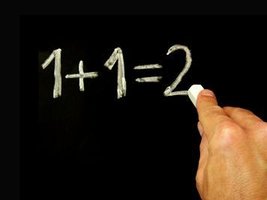
I stink at math.
It’s no secret.
In fact, I’ve long made a habit of prefacing conversations with, “I’m not good with numbers” or “Math was never my strong suit.”
Unfortunately, it seems I’ve made those comments in front of my mini me enough that she’s begun repeating them. Even worse, she’s now using them as an excuse for her poor math scores.
Like mother, like daughter… in a bad way.
If there is a bright side to my mistake, it’s that I am cognizant of what I’ve done and I’m now working hard to remedy it. For starters, I recently sat down with my third grader and explained that just because Mommy is not a math whiz it doesn’t mean that she is automatically doomed to fail when it comes to numbers. The fact is I don’t completely suck at math; rather, I am simply stronger at other subjects. My daughter is the same way. However, I don’t want her to doubt her abilities simply because she has to work harder adding, subtracting, multiplying and dividing than she does reading and writing.
My efforts have been met with moderate success, but I still worry about my daughter’s math anxiety.
And according to a new study, I have every reason to be concerned.
Researchers at the University of Chicago found that math anxiety was “most detrimental to the highest-achieving students, who typically have the most working memory.”
In other words, your child’s math-related fears and worries can undermine him/her so much that he/she can fall behind other students who don’t have the same anxiety.
The University of Chicago’s research team found that worries about math can disrupt working memory which can lead to poor performance of otherwise successful students, placing them almost half a school year behind their less anxious peers, in terms of math achievement.
“Early math anxiety may lead to a snowball effect that exerts an increasing cost on math achievement by changing students’ attitudes and motivational approaches towards math, increasing math avoidance, and ultimately reducing math competence,” the study’s author noted.
So what can be done to alleviate math anxiety?
Researchers recommend having kids write about their worries. The procedure is called “expressive writing.” It is designed to help students “download worries and minimize anxiety’s effects on working memory.” If your child is too young to articulate his concerns via writing, have him draw pictures instead. In addition, researchers say parents can help their child deal with math anxiety by helping them see exams as a challenge rather than as a threat.
Does your child suffer from math anxiety?

